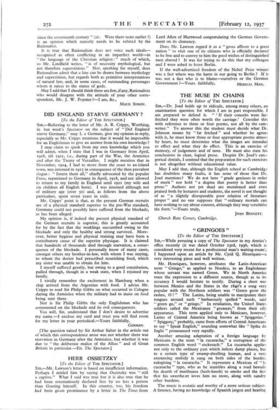THE MUSE IN CHAINS
[To the Editor of THE SPECTATOR.] Sm,—Dr. Joad holds up to ridicule, among many others, an examination question for which I am in part responsible. I am prepared to defend it. " If their conceits were far- fetched they were often worth the carriage.' Consider this with reference to three or four poems, not all by the same writer." To answer this the student must decide what Dr.
Johnson means by " far fetched " and whether he agrees with it, he must know three or four appropriate poems almost by heart, he must determine what the images are intended to effect and what they do effect. This is an exercise of memory, of judgement and of taste. He must also state his conclusions in clear, logical prose. Despite Dr. Joad's catc- gorical denials, I contend that the preparation for such exercises is not altogether without educational value.
May I add that, although the English school at Cambridge has doubtless many faults, it has none of those that Dr. Joad mentions ? We do not here " grade geniuses in order of merit " nor hold " a dogma that poetry is better than prose." Authors not yet dead are mentioned and even praised both by lecturers and students, the novel is not thought of as " a slightly disreputable poor relation of literature proper " and no one supposes that " ordinary mortals can have nothing to say about content, although they may scrutinise the form."—Yours truly, Church Rate Corner, Cambridge.
JOAN BENNETT.














































 Previous page
Previous page